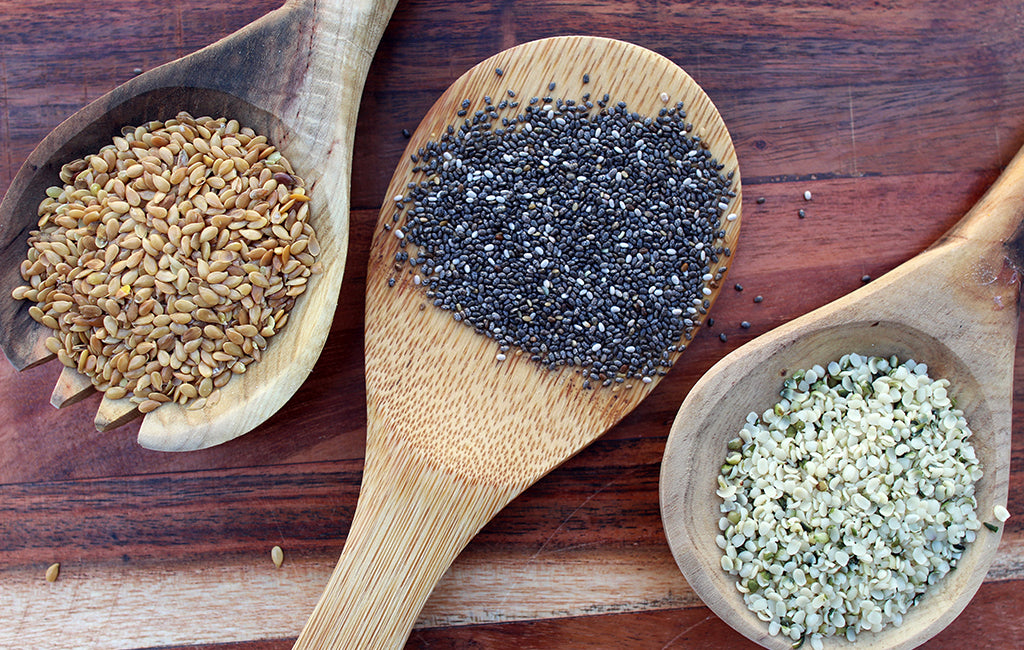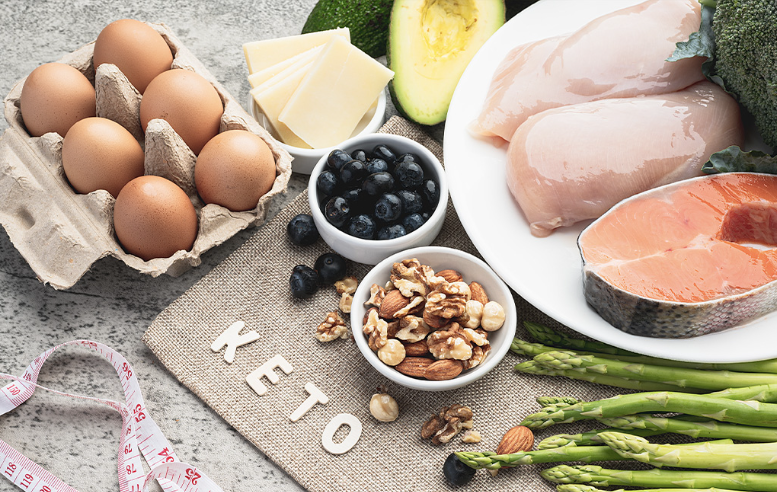
Hankering for a seedy snack or a healthy ingredient to add to your favorite meals? Seeds have long been a great source of vitamins, minerals, proteins and so much more, but what are the differences between two of the most popular seeds on the market today?
When it comes to hemp seeds vs chia seeds, both offer unique and amazing benefits.
While it's important to note that neither seed is a cure or treatment for illness, both have a long history of supporting health and vitality.
Read on to learn about the history, nutrition content and various uses of hemp and chia seeds. Along the way, you’ll discover simple and effective ways to introduce these seeds into your diet and explore other healthy additions that you can add to your daily routine.
History of Hemp and Chia Seeds
Before you start chowing down on these healthy seeds, you might be curious to learn a little background on how each has been used throughout human history, where these seeds come from and why they’ve been favorites among cultures around the world.
Hemp Seeds
What is hemp exactly? Nearly five thousand years ago, hemp cultivation began in China. Natural to central Asia, hemp is a fibrous leafy plant related to the cannabis plant. Although it’s lacking in the high levels of THC commonly associated with cannabis, hemp is cultivated for its edible seeds and its fibers, which are used for various textiles.
A resilient crop, hemp was transported across Europe, eventually making its way to South, Central and North America where much of it is grown today.
Consider these key facts about early hemp and hemp seed cultivation:
- Non-psychoactive – Hemp is commonly confused with the high-THC cannabis plant used as a psychoactive drug. These two plants are very similar but decisively different, as the hemp plant typically contains less than 0.3% THC, trace amounts incapable of causing any psychoactive effects.
- Originally considered a by-product – While the benefits and industrial uses of the hemp plant were clear to people hundreds and even thousands of years ago, the use of hemp seeds was not so obvious. Because of a lack of nutritional knowledge, the health-supporting benefits of hemp seeds were long ignored until the recent past.
- A new dawn for hemp seeds – The newest research and exploration of hemp seeds is only a few years old at this point. Due to recent regulation changes, consumers finally have access to hemp seeds for the first time in several decades.
Chia Seeds
A member of the mint family, chia is an annual herb native to Guatemala and Mexico. A green, leafy plant with colorful flowers, chia grows well in dry, desert areas and is highly resistant to insects and other pests.
Highly popular during the Mesoamerican period, chia and chia seeds were used and consumed by ancient civilizations like the Aztecs. Additionally, they played a central role in various traditions, ceremonies and feasts. After the arrival of the Spanish to North America, chia seeds were slowly dispersed by other grain and cereal crops.
Throughout the last few decades, Americans have seen a reemergence of this ancient crop. Now chia seeds are widely available in various grocery and health-food stores.
Additionally, the new growth of chia seeds can be linked to the following:
- Agricultural engineering – In the 1990s, agricultural engineer Wayne Coates began investigating the health benefits of chia seeds, encouraging farmers in Argentina to grow chia and export the seeds around the world.
- Growth of nutritional knowledge – As more scientists and educators explore the field of nutrition, the average American has more opportunities to learn about healthy dietary options. It’s only natural that unique health-positive food would garner more attention due to consumer interest and demand.
- Superfood – While the term “superfood” is not a technical, scientific classification, it’s becoming increasingly popular with consumers and manufacturers to denote highly nutritious food options. With the rising popularity of superfoods, chia seeds are a natural addition to the grocery list of health-conscious consumers.
Nutritional Benefits of Hemp and Chia Seeds
If you’re curious about hemp and chia seeds, you’re likely interested in what option might offer the best boost to your health. While it's important to note that neither seed is a cure or treatment for illness, both have a long history of supporting health and vitality.
Hemp Seeds
Whether eaten on their own or used as an ingredient, hemp seeds can offer major nutritional value. Despite their small size, these seeds are packed with health-supporting nourishment including:
- Protein – An essential building block of our cells, protein is a source of energy and endurance. In a standard 30-gram serving of hemp seeds, you can expect nearly 10 grams of protein, making it an excellent source for your daily protein needs.
- Omega-6 fatty acids – A healthy fat associated with various plant-based foods, omega-6 fatty acids are crucial for proper cellular functions. Consumed in moderation, omega-6 fatty acids remain a staple of a balanced diet.
- Potassium – Essential for proper muscle function, potassium is an electrolyte used to balance sodium retention within your body. Potassium also contributes to blood pressure and heart rate regulation.
In addition to dietary benefits, hemp seeds have been associated with cognitive benefits and may provide some anti-inflammatory properties.
Chia Seeds
Are hemp seeds and chia seeds the same when it comes to nutritional value? Not exactly. While both offer similar benefits, there are specific differences to account for.
Chia seeds are super seeds, well known for their high caloric value. With a high carbohydrate content, they can provide instant energy, especially for athletes looking to refuel. Other super seeds include pumpkin seeds.
Additionally, you can count on chia seeds to provide the following nutritional value:
- Fiber – Prioritize your gut health by paying attention to your dietary fiber intake. Chia seeds remain a great option for increasing the fiber in your diet, providing a great benefit to your gastrointestinal health. Increasing your dietary fiber intake can support heart health and improve blood sugar levels.
- Omega 3 fatty acids – Similar to omega 6 fatty acid benefits, omega 3 fatty acid benefits including supporting several important biological functions. Some benefits also include improving heart health and reducing inflammation. Most nutritionists recommend a balance of omega 3s and omega 6s for an optimal diet. Can you eat hemp seeds with chia seeds? Absolutely. They may provide enhanced health benefits when taken together.
- Minerals – Looking to increase your mineral consumption? Chia seeds are full of calcium, magnesium and selenium — all of which are essential for a healthy diet.
Culinary Uses of Hemp Seeds and Chia Seeds
Both hemp and chia seeds are perfectly edible on their own. Of course, it might not be the most enjoyable way to experience the health benefits and could even turn you off from these superfoods for good. If you’re interested in making seeds a part of your diet, consider the following culinary possibilities.
Hemp Seeds
What is hemp used for when it comes to the kitchen? Crunchy and nutty, hemp seeds have a mild flavor and enjoyable texture that makes them an easy addition to several recipes. Consider the following options for utilizing hemp seeds in your next meal:
- Salads – Amplify your salad with a hearty sprinkle of hemp seeds on top. Mixed with greens and other veggies, hemp seeds can add a nut-like crunch and an enjoyable texture to your plate.
- Oils – For a low-heat cooking oil or a flavorful addition to your homemade salad dressing, consider experimenting with hemp seed oil. Extracted from hemp seeds, hemp oil offers much of the same nutritional benefits in a unique and versatile form.
- Dessert – Make your after-dinner treat a little healthier by adding hemp seeds on top of your favorite dessert. A sprinkle of hemp seeds goes perfectly with ice cream or even a fruit pie.
If you already enjoy the taste of hemp seeds, you might also consider investigating other hemp derivatives like hemp milk and hemp-based protein powder. The applications of hemp are nearly limitless, and if you’re curious about the potential of this plant, check out Zebra CBD and our selection of hemp-based CBD solutions. You can also learn more about the difference between CBD oil and hemp oil to understand how they relate to each other.
Chia Seeds
With thousands of years of culinary experimentation, chia seeds are an equally versatile option, lending themselves to unique recipes and health-food innovations.
If you’re looking to try chia seeds, consider the following ideas to bring this healthful plant product into your diet:
- Baked goods – Cakes, brownies and bread can all be elevated with a few tablespoons of chia seeds. Not only will this enhance the recipe’s nutritional value, but it will also provide a great texture to your goodies.
- Thick shake – Chia seeds are known for their ability to absorb liquid, causing the seeds to thicken and become jelly-like, creating an entirely new texture experience. This makes them a great ingredient for a thickened smoothie, shake or juice. Adding chia seeds, as well as hemp seeds, to smoothies or shakes can also increase fiber intake.
- Sprouted – Much like sprouted grains, chia seeds can be sprouted in water or non-dairy beverages like almond milk and added to numerous dishes including salads, sandwiches and overnight oats.
Concerns Related to Hemp Seeds and Chia Seeds
Before adding new food to your diet, you might want to consider all the potential side effects or concerns to help maximize your healthy eating. While both hemp seeds and chia seeds are generally considered safe for human consumption, you may still have some questions about these seeds.
Hemp Seeds
Because hemp seeds are relatively new to most Americans, it only makes sense to have a few questions regarding this superfood. Some common concerns include the following:
- Are hemp seeds legal? – As of the 2018 Farm Bill, hemp seeds are federally legal and no longer considered a controlled substance, so long as they contain less than 0.3% THC. This legislation is fairly new and state or local ordinances may differ, but ultimately, it should be legal for you to purchase and consume hemp seeds.
- Can you eat too much? – Like anything, hemp seeds are best enjoyed in moderation. Consuming high amounts of hemp seeds should not pose any particular health risks, although the high-fat content of these seeds could lead to a bit of discomfort and bloating when eaten in excess.
Chia Seeds
If you’ve never tried chia seeds, you may be concerned about the long-term health impacts or side effects of this all-natural plant product. Fortunately, there’s no evidence to suggest that chia seeds pose any general health risks to consumers.
That said, if eaten excessively, you may deal with any of the following issues:
- Digestive problems – When eaten in moderation, chia seeds are a good source of fiber to help support a healthy gut. Unfortunately, if you eat too many chia seeds, you may experience digestive discomfort due to the high amount of fiber.
- Allergic reaction – Although uncommon, it’s not unheard of for individuals to develop various chia-related allergies. If you notice any negative side effects such as itching, sneezing, vomiting or gastrointestinal discomfort after eating chia seeds, it’s recommended that you remove these seeds from your diet.
Hemp Seed vs Chia Seed: Find Your Next Health Boost at Zebra CBD
After exploring these two seeds, it should be clear that both provide unique health benefits that nearly anyone can enjoy. Hemp seed or chia seed, you’re bound to find the wellness-supporting nutrition you crave.
For those looking for another natural addition to their daily wellness, Zebra CBD offers a variety of hemp-based supplements designed to elevate your body and mind.
At Zebra CBD we’re revolutionizing the industry by providing all-natural ingredients, high-potency CBD products and a fully transparent business model. We’re proud to offer CBD solutions like CBD Joint & Muscle Tablets,CBD Rub and Full-Spectrum CBD Oil. Visit us to discover the widest range of CBD products, crafted with care and delivered to your door.
Sources:
Britannica. Hemp.https://britannica.com/plant/hemp
Britannica. Chia.https://britannica.com/plant/chia
National Library of Medicine. High Fiber Diet. https://www.ncbi.nlm.nih.gov/books/NBK559033/
National Library of Medicine. Omega-3 Fatty Acids. https://www.ncbi.nlm.nih.gov/books/NBK564314/
NPR. Chewing Chia Packs A Superfood Punch.https://npr.org/2012/07/15/156551074/chewing-chia-packs-a-superfood-punch
Medical News Today. What to know about omega-6 fatty acids.https://medicalnewstoday.com/articles/omega-6-fatty-acids#summary
Medline Plus. Potassium.https://medlineplus.gov/potassium.html
Medical News Today. What are the benefits and nutritional value of chia seeds?https://medicalnewstoday.com/articles/291334
US Customs and Border Protections. Importing hemp seeds and hemp plants into the United States.https://help.cbp.gov/s/article/Article-1751?language=en_US#:~:text=The%20Agriculture%20Improvement%20Act%20of,not%20greater%20than%200.3%20percent
Healthline. Does Eating Too Many Chia Seeds Cause Side Effects?https://healthline.com/nutrition/chia-seeds-side-effects#TOC_TITLE_HDR_6










